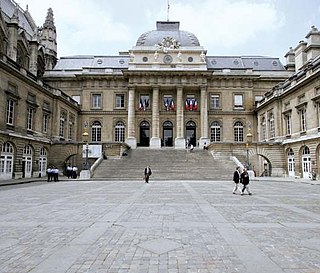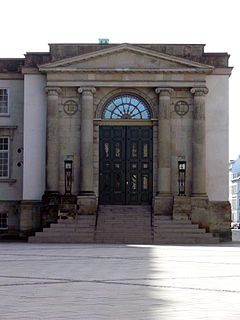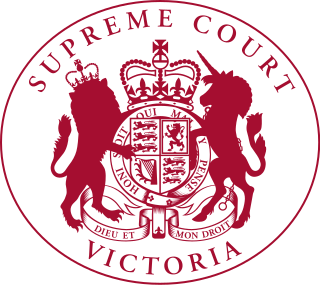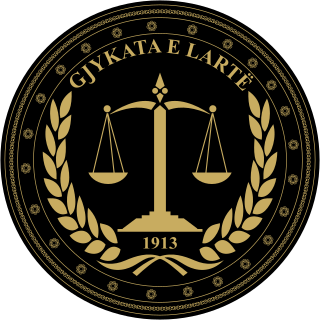
The Court of Cassation is one of the four courts of last resort in France. It has jurisdiction over all civil and criminal matters triable in the judicial system, and is the supreme court of appeal in these cases. It has jurisdiction to review the law, and to certify questions of law, to determine miscarriages of justice. The Court is located in the Palace of Justice in Paris.

The Judicial Yuan is the judicial branch of the government of the Republic of China on Taiwan. It runs a Constitutional Court and oversees all systems of courts in Taiwan, including ordinary courts like the supreme court, high courts, district courts as well as special courts like administrative courts and disciplinary courts. By Taiwanese law, the Judicial Yuan holds the following powers:

A tribunal, generally, is any person or institution with authority to judge, adjudicate on, or determine claims or disputes—whether or not it is called a tribunal in its title. For example, an advocate who appears before a court with a single judge could describe that judge as "their tribunal". Many governmental bodies that are titled 'tribunals' are so described to emphasize that they are not courts of normal jurisdiction. For example, the International Criminal Tribunal for Rwanda was a body specially constituted under international law; in Great Britain, employment tribunals are bodies set up to hear specific employment disputes. In many cases, the word tribunal implies a judicial body with a lesser degree of formality than a court, to which the normal rules of evidence and procedure may not apply, and whose presiding officers are frequently neither judges nor magistrates. Private judicial bodies are also often styled 'tribunals'. However, the word tribunal is not conclusive of a body's function—for example, in Great Britain, the Employment Appeal Tribunal is a superior court of record.

The Courts of Denmark is the ordinary court system of the Kingdom of Denmark. The Courts of Denmark as an organizational entity was created with the Police and Judiciary Reform Act taking effect 1 January 2007 which also significantly reformed the court system e.g. by removing original jurisdiction from the High Courts and by introducing a new jury system.

In France, career judges are considered civil servants exercising one of the sovereign powers of the state, so French citizens are eligible for judgeship, but not citizens of the other EU countries. France's independent court system enjoys special statutory protection from the executive branch. Procedures for the appointment, promotion, and removal of judges vary depending on whether it is for the ordinary or administrative stream. Judicial appointments in the judicial stream must be approved by a special panel, the High Council of the Judiciary. Once appointed, career judges serve for life and cannot be removed without specific disciplinary proceedings conducted before the Council with due process.
The federal judiciary of the United States is one of the three branches of the federal government of the United States organized under the United States Constitution and laws of the federal government. Article III of the Constitution requires the establishment of a Supreme Court and permits the Congress to create other federal courts, and place limitations on their jurisdiction. Article III federal judges are appointed by the president with the consent of the Senate to serve until they resign, are impeached and convicted, retire, or die.

Under the Constitution of Finland, everyone is entitled to have their case heard by a court or an authority appropriately and without undue delay. This is achieved through the judicial system of Finland.

The judicial system of Turkey is defined by Articles 138 to 160 of the Constitution of Turkey.

In Greece, the Council of State is the Supreme Administrative Court of Greece.
The judicial system of Greece is the country's constitutionally established system of courts.

The supreme court is the highest court within the hierarchy of courts in many legal jurisdictions. Other descriptions for such courts include court of last resort, apex court, and highcourt of appeal. Broadly speaking, the decisions of a supreme court are not subject to further review by any other court. Supreme courts typically function primarily as appellate courts, hearing appeals from decisions of lower trial courts, or from intermediate-level appellate courts.

The Supreme Court of Victoria is the highest court in the Australian state of Victoria. Founded in 1852, it is a superior court of common law and equity, with unlimited and inherent jurisdiction within the state.

The courts of appeal are the main appellate courts in the judicial system of Belgium, which hear appeals against judgements of the tribunals of first instance, the enterprise tribunals and the presidents of those tribunals in their judicial area. There are five courts of appeal for each of the five judicial areas, which are the largest geographical subdivisions of Belgium for judicial purposes. The division of the Belgian territory into the five judicial areas is laid down in article 156 of the Belgian Constitution. A judicial area covers multiple judicial arrondissements ("districts"), except for the judicial area of Mons. Each arrondissement has a tribunal of first instance. Further below, an overview is provided of the five courts of appeal and the judicial arrondissements their judicial area covers. It is important to note that the courts of appeal do not hear appeals against judgements of the labour tribunals; these are heard by the courts of labour.
The Judiciary of Indonesia comprises the Supreme Court of Indonesia and the Constitutional Court of Indonesia together with public courts, religious courts, administrative courts and military courts.

The Supreme Court of the Republic of Albania is the highest court of Albania and is the final court of appeal in the judicial system of Albania. It is composed of seventeen judges, the Chief Justice and sixteen Members.

The judiciary of Belgium is similar to the French judiciary. Belgium evolved from a unitary to a federal state, but its judicial system has not been adapted to a federal system.
The judiciary of Luxembourg comprises a number of courts.
The Judiciary of Kosovo is the collection of the central Kosovo institutions that exercises judicial authority in Kosovo. According to the 2008 Constitution of Kosovo, the judicial system is composed of the Supreme Court and subordinate courts, a Constitutional Court, and an independent prosecutorial institution. The courts are administered by the Kosovo Judicial Council.
The Judiciary of Albania interprets and applies the law of Albania. Albania's judicial system is a civil law system divided between courts with regular civil and criminal jurisdiction and administrative courts. Albanian law is codified and based on the French law. It is governed by the High Council of Justice (Këshilli i Lartë i Drejtësisë), and its management is aided by the office of the President of Albania, the Ministry of Justice, and the various courts chairpersons.
The Judiciary of Azerbaijan exercises judicial power separately from the legislative power of parliament and executive power of the president.













